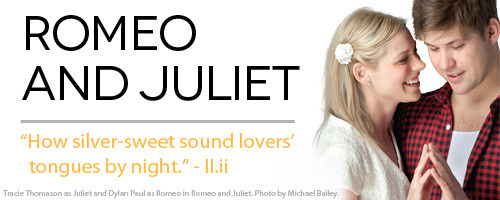Clifford Garstang's Blog, page 77
July 1, 2013
Museums: Virginia Museum of Fine Art
 Until earlier this year, my art museum visits had been sporadic for a long time. I did manage to see the Chrysler Museum of Art in Norfolk last year (it’s currently closed for renovations) because of an even hosted by the Northwestern University Club of Virginia, but I haven’t been a regular museum goer since the days I lived in Chicago and was a member of the Art Institute of Chicago. (Even when I lived in DC I only infrequently made it to any of the Smithsonian buildings.)
Until earlier this year, my art museum visits had been sporadic for a long time. I did manage to see the Chrysler Museum of Art in Norfolk last year (it’s currently closed for renovations) because of an even hosted by the Northwestern University Club of Virginia, but I haven’t been a regular museum goer since the days I lived in Chicago and was a member of the Art Institute of Chicago. (Even when I lived in DC I only infrequently made it to any of the Smithsonian buildings.)
But I made a trip to Boston earlier this year for the AWP Conference and while I was there, having a little extra time, I went to the Boston Museum of Fine Arts. Twice. That was wonderful, and it reminded me how much I do love art museums and art. So a couple of months ago when I found myself in DC with an afternoon to spare, I visited both the National Gallery of Art and the Freer-Sackler. (I went back to the NGA a couple of weeks ago when I was in DC to see some plays.)
And then I recalled that Richmond also has a wonderful museum: the Virginia Museum of Fine Arts. I don’t get to Richmond too often–It’s a little under two hours away–but because they have an Out of Town Membership, I decided to join.
And finally this weekend I was able to visit the museum because I was in Richmond for a meeting. I loved it. Because it was my first visit, I decided I would try to see everything. Next time I go I’ll focus more, but for now I wanted to get the lay of the land. I can’t wait to go back.
The current special exhibit–free to members, so that was a plus–is pop art by Tom Wesselmann. While I’m not a pop art fan, normally, Wesselmann has a couple of series that I really liked, including the Bedroom Paintings. You can see some of the images here.
June 26, 2013
2013 Reading: The Varieties of Scientific Experience by Carl Sagan
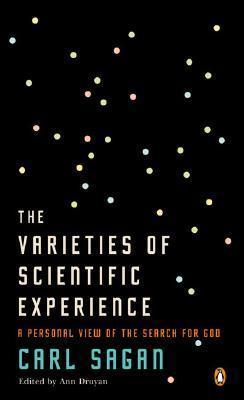 The Varieties of Scientific Experience: A Personal View of the Search for God by Carl Sagan
The Varieties of Scientific Experience: A Personal View of the Search for God by Carl Sagan
Our Reading Liberally book club selected this book because the members wanted to read more science. It was a terrific selection and works well, I think, with some of the books we’ve read about religion. For one thing, Sagan is not disrespectful to religion; he does, however, demonstrate the absurdity of most religious belief merely by examining what we know about the cosmos. It’s breathtaking.
The book is from a series of lectures Sagan gave in 1985, so in some respects it is a bit outdated.
We begin with an attempt to understand how vast the universe is. The Big Bang occurred about 15 Billion years ago (or 15,000 Million years, as used in this book) and life appeared on Earth about 5 Billion years ago. And while we don’t know whether we’re alone in the universe or not, it’s important to understand what the possibilities are. There are 400 billion stars in our galaxy, the Milky Way, of which our sun is just one. And there are maybe that many galaxies in the Universe, each with that many stars. (And he hints that maybe we should be asking ourselves if there aren’t also other Universes . . .)
The mind being fully blown, we are then taken through a series of questions concern various topics–extraterrestrial intelligence, the god hypothesis, etc.–and relates our understanding of astronomy to questions of religion.
Tough to be a god-believer after reading a book like that.
June 24, 2013
The New Yorker: “Mastiff” by Joyce Carol Oates
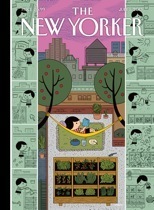 July 1, 2013: “Mastiff” by Joyce Carol Oates
July 1, 2013: “Mastiff” by Joyce Carol Oates
To begin with, you should read this story, which is available online for free. In my opinion, it’s a leading contender for story of the year.
The story inhabits the consciousness of two characters, a woman and a man who have been seeing each other and are now on a hike. The woman is 41, never married. The man is somewhat older (we learn how much older before the end of the story), also never married. She runs an art gallery. He is a scientist and very involved with his work. On the trail they encounter another hiker with an English Mastiff (this one at least 200 lbs.) and the woman—although we learn her name, the man and the woman think of each other as woman and man—is afraid, thanks to an encounter she had with a German Shepherd when she was a girl. The continue hiking and on the way down they meet up with the Mastiff a second time. Given the title, it’s probably no surprise that the dog attacks.
What I like about this story is that I don’t like either of the main characters. I recognize them. I sort of AM them. But I don’t like them. In the Q&A with Joyce Carol Oates, Oates addresses this beautifully: “I sympathize with—and identify with—all sorts of people. I think that there is a measure of hypocrisy in those who profess surprise at flawed characters in fiction—virtually everyone is flawed, and everyone is, at one time or another, ignoble. The concept of a ‘hero’ is unreal and of little interest. Also, we fall in love with imperfect people—some of us with actual criminals, murderers. This is a fact of life. ” So, these are flawed people, but that makes them all the more real.
The most important aspect to the woman’s personality is her fear. She’s afraid of the dog, but she’s also afraid of being alone and, probably, of NOT being alone. At the end of the story she may be close to coming to terms with this paradox.
A very good story. I recommend it and also the short interview.
New Prime Number Magazine Update
 Regular readers know that I am the editor of Prime Number Magazine, an online literary quarterly with a print annual edition. Besides our quarterly issues, we also post updates every three weeks, giving us an opportunity to publish flash fiction, shorter non-fiction, and single poems.
Regular readers know that I am the editor of Prime Number Magazine, an online literary quarterly with a print annual edition. Besides our quarterly issues, we also post updates every three weeks, giving us an opportunity to publish flash fiction, shorter non-fiction, and single poems.
The latest update, No. 37.5 (that is, the 3rd update for Issue 37, which is our 12th issue) has just gone live. I think you’ll like it! We’ve got flash fiction by R. T. Smith (the editor of Shenandoah) and Lori D’Angelo; poetry by Peycho Kanev and Janeen Pergrin Rastall; and a review of a flash fiction chapbook by Bonnie ZoBell.
I hope you’ll like what you see. If you do, you can support us by purchasing a copy (or two) of the print annual. And if you’re a writer, please submit work to the magazine. For Submission Guidelines and links to our online submission manager, go here.
And stay tuned for an exciting contest announcement!
June 21, 2013
Theater: “Romeo & Juliet” at the American Shakespeare Center
From “feel good” (Anything Goes last night at the Kennedy Center) to “feel lousy” (Romeo & Juliet at the American Shakespeare Center). Quite a contrast. Last night: everyone singing and dancing for the finale. Tonight: the bodies of star-crossed lovers litter the stage, with weeping parents draped over them. A nice balance?
We all know how the play turns out, right? Romeo doesn’t get the letter so he thinks Juliet is dead, so he kills himself with poison; when she awakes from the sleeping potion and finds him dead, she stabs herself. No surprises there. But there ARE some surprises in this production of an otherwise depressing play. (No need to remind me that the reconciliation of the Montagues and the Capulets as a result of these deaths provides some hope for the future; I’m aware of that, but skeptical.)
So, for the surprises: As tragic as the second half of the play is, there’s quite a lot of comedy in the first half. I loved the scenes of banter among Romeo and his pals. And I also loved the scenes with Juliet and her nurse. One reason why the scenes with the nurse are so entertaining is that the director chose to have the nurse played by a man (Ben Curns), who is hilarious in drag. A very nice touch.
The performances generally are outstanding. Really excellent. As Romeo and Juliet, Dylan Paul and Tracie Thomason give the play tenderness. The animus comes from their fathers, primarily: Capulet played by Rene Thornton Jr. and Montague played by Ben Curns. Their wives, played by newcomers Lee Fitzpatrick and Emily Brown provide the emotion. And, as always, the music before the show and during the interlude is fantastic. I come early because I hate to miss a note of the pre-show music.
Highly recommended!
June 20, 2013
Theater: “Anything Goes”
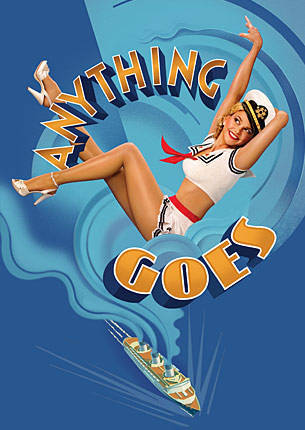 Now, that’s entertainment. I suppose that was the point back in 1934 when this Cole Porter musical first appeared, and that’s the point now. I saw the show at the Kennedy Center in DC and I was part of a very appreciative audience. (The show runs through July 7 in DC and then moves on to other East Coast cities and back to the West Coast.)
Now, that’s entertainment. I suppose that was the point back in 1934 when this Cole Porter musical first appeared, and that’s the point now. I saw the show at the Kennedy Center in DC and I was part of a very appreciative audience. (The show runs through July 7 in DC and then moves on to other East Coast cities and back to the West Coast.)
But I suspect I approached the show quite differently from the rest of the people in the audience–one of the stars is a good friend of mine. In fact, I had lunch today with Fred Applegate and his wife and spent most of the afternoon with them. Fred, besides being my roommate in college, plays Moonface Martin in the show, part of a really excellent cast. It was fun to wait for him after the show at the stage door and bask in a little reflected glory.
I’d never seen the show before, but I suspect everyone else knows the story, which is more or less a Shakespearean comedy set to music–thwarted romance, mistaken identity, disguises, schemes, and multiple weddings to wrap up the confusion in the end. Along the way, there are wonderful Cole Porter songs and some very impressive dance numbers.
Definitely an entertaining couple of hours, even if you don’t know someone in the cast.
June 18, 2013
Emerging Writers: How you can help
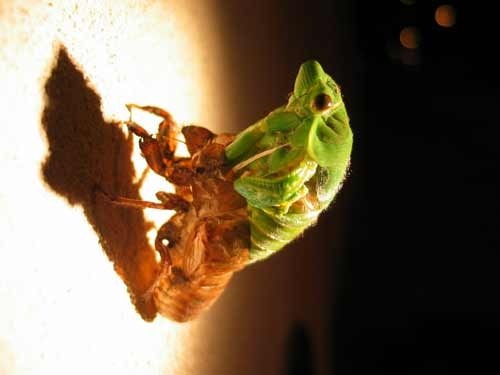 I will probably never be a best-selling author. I might not ever be published by one of the big publishing houses. That’s okay. I’d like to have an audience for my work, but that’s not very much in my control. All I can do is write and do what I can to reach readers. Which means I am exactly like thousands (hundreds of thousands?) of emerging writers who struggle to be published and read. If you’re one of those writers, this post is aimed at you.
I will probably never be a best-selling author. I might not ever be published by one of the big publishing houses. That’s okay. I’d like to have an audience for my work, but that’s not very much in my control. All I can do is write and do what I can to reach readers. Which means I am exactly like thousands (hundreds of thousands?) of emerging writers who struggle to be published and read. If you’re one of those writers, this post is aimed at you.
There sure are a lot of books being published, aren’t there? Too many to keep up with. And the more I hang around writers, the more writers I know who have books coming out. I can’t read them all. But I can read some of them, and so can you. I can’t buy them all, either (although I buy more than I can read), but I can buy some of them. I can’t do full length reviews of every book I read. I don’t have that kind of time. But what I can do–and you can too–is do ratings and brief reviews on Goodreads and Amazon.com. It only takes a few minutes, and it is greatly appreciated by authors.
That’s it. Pretty simple.
1. From time to time, or more often, buy a book by an emerging writer.
2. Read the book.
3. Write a review on a blog–yours or someone else’s–or on Goodreads or on Amazon.com.
(P.S. The image is of an emerging cicada–the mid-Atlantic is seeing one of the 17-year broods at the moment.)
The Writer’s Handful: Patricia Ann McNair interviews me
 I’m honored to have been invited by Patricia Ann McNair to participate in The Writer’s Handful, a series of brief interviews running on her blog every Monday. Please take a look, if for no other reason than to learn why I’ve posted a picture here of a three-toed sloth.
I’m honored to have been invited by Patricia Ann McNair to participate in The Writer’s Handful, a series of brief interviews running on her blog every Monday. Please take a look, if for no other reason than to learn why I’ve posted a picture here of a three-toed sloth.
Other writers featured in the series include Rob Davidson, Katey Schultz, Don McNair, Tony Romano, Ken Rodgers, Rob Roensch, and Samantha Hoffman. Check them all out here.
June 17, 2013
2013 Reading: Flashes of War by Katey Schultz
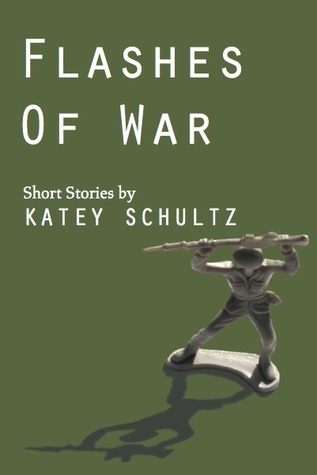 Flashes of War by Katey Schultz is a surprisingly good book. I say this even though the author is a friend (we met a couple of years ago at the Virginia Center for the Creative Arts). I heard her read from the book, and I remember being impressed by what I heard. And yet, my expectations for this book were low–Schultz isn’t a veteran and hasn’t been to Iraq or Afghanistan, so how credible could she make these war stories.
Flashes of War by Katey Schultz is a surprisingly good book. I say this even though the author is a friend (we met a couple of years ago at the Virginia Center for the Creative Arts). I heard her read from the book, and I remember being impressed by what I heard. And yet, my expectations for this book were low–Schultz isn’t a veteran and hasn’t been to Iraq or Afghanistan, so how credible could she make these war stories.
As it turns out, very credible. Although I don’t have first-hand war experience, I have certainly read a lot of war stories and these stories absolutely rang true for me. And one thing that I loved about this collection is that the stories are so varied. The book begins with a flash fiction from the point of view of an American soldier in Afghanistan. Then one from the point of view of an Afghan woman. Then a soldier back home on leave. Then an Afghan mother in Kabul. Then a soldier in Iraq. Then an Iraqi family. Because these are war stories, there are some tragedies among them, and these can be painful to read. But there is some hopefulness, too. There’s a suggestion that some wounds do heal.
Another appealing facet of the book is the variation in the length of the stories. Although the title suggests “flash fiction,” several of the stories are longer, which makes a nice counterpoint with the very short stories. One of my favorite longer stories is “Deuce Out” about a young woman who graduates from high school and immediately enlists in order to follow in the footsteps of her older brother. It’s not hard to see what’s going on in this young woman’s mind. Another favorite is “The Ghost of Sanchez” in which a soldier witnesses the death of Sanchez, and then, perhaps because he wasn’t able to retrieve the body immediately, is forced to deal with the ghost of Sanchez. That must happen a lot.
The book is published by Apprentice House, a small press affiliated with Loyola University of Maryland in Baltimore. Visit the author’s website: Katey Schultz.
The New Yorker: “Stars” by Thomas McGuane
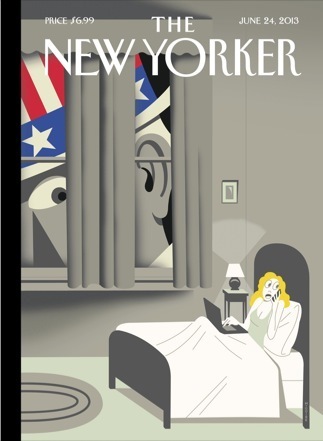 June 24, 2013: “Stars” by Thomas McGuane
June 24, 2013: “Stars” by Thomas McGuane
We learn from the Q&A with Thomas McGuane that this is NOT an excerpt from a novel, as I was sure it must be. He’s got a story collection coming out and he loves writing stories. I wish I could say that I loved reading this one.
Jessica is an astronomer in Montana. She goes on a hike and encounters a man who has trapped and is about to kill a wolf. She wants him to spare the wolf and says she’d rather kill the man. When the man hands her his gun and gives her the opportunity, she can’t do it. He shoots the wolf and she goes home. And increasingly she takes on an anti-social aura. She’s rude to everyone, including the father of a man she’s sleeping with. She realizes that she needs help with her anger issues, but nothing helps. Finally she resorts to taking longer and longer walks.
So maybe the point is that she’s so angered by man’s assault on nature that she’s driven to the brink. She’s an astronomer, but she doesn’t seem to draw any conclusions from man’s minuscule place in the universe. And I have a hard time forgiving her rudeness to Andy’s father. Is it that the rape of nature has made her angry, or is it that she’s an angry, and not very likable, person.
We’ve seen a lot of McGuane stories in the magazine. I wish I liked them better.

